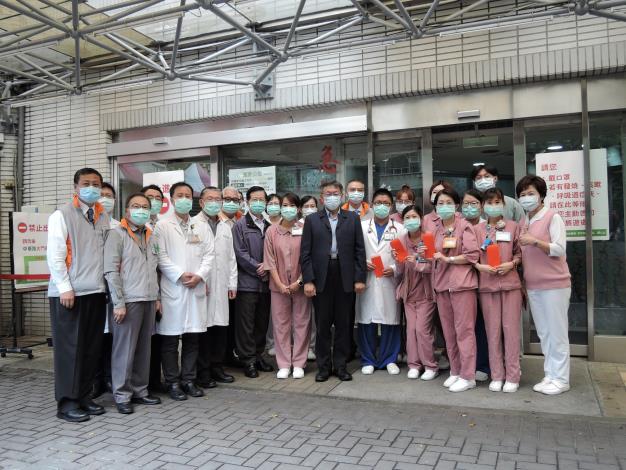Combining Health Care and Social Care: Returning to the Needs of Patients Physician Mayor Ko Wen-Je: We Take Care of People in the Community
Today (December 10) Mayor Ko transformed into a community doctor, not forgetting the elderly in the community during this challenging pandemic time. Mayor Ko stated that the most basic principle of Taipei City Hospital is “caring for people in the community”; playing the role as integrator, with the families of dementia sufferers at the center, the public-private partnership model is adopted to build care services that integrate various disciplines and illuminate the entire spectrum of life. Dementia sufferers account for around 1.24% of the total population of Taiwan. Taipei City Hospital carried out a survey of dementia sufferers and their families and identified five main questions that are of most concern to them: Mayor Ko said that when dealing with dementia in the past the focus was on the patients, but we must now expand our view to include the whole family. In the past, only medical professionals were involved, leaving many gaps, but now we know that an interdisciplinary, even cross-area, integrated approach is needed to fill in the gaps. From the standpoint of dementia sufferers and carers, we must ask “What do they really care about?” This is the way of thinking the health care system most needs to adopt. One person can’t do many things and health care also has its limits, therefore, external resources, including NPO (Non-profit Organizations) and government agencies need to be linked to. For example, when an elderly person goes missing, the assistance of police, fire and transportation departments can be relied on, with civil affairs units and shops even linked up with to jointly create a friendly environment, allowing neighborhoods to know how to get on with dementia sufferers. Taipei City Hospital Dementia Center recently received the 2020 Taiwan Healthy City and Age-friendly Cities Innovation Awards and the 3rd Government Service Award. The awards affirm the innovative actions of Taipei City Hospital. They also mean that with a heart full of respect and gratitude and setting out from the needs of patients and their families, Taipei City Hospital gathers together innovation capacity and tries innovating to provide non-standard health services that win the acceptance of various quarters. Commissioner of Taipei City Department of Health Huang Shier-Chieg stated, taking the Dementia Center’s “integrated care” as an example, in fast-aging societies, more and more care models are turning in this direction. Dementia does not only involve loss of physical function, it also involves cognitive ability; a big effort is being made at present to change the name of dementia to “cognitive disorder” . Many chronic patients in long-term care gradually undergo functional decline, a process that is long and needs special medical and life care, a situation that puts extreme pressure on carers. Long-term care overseas began advocating “people first” years ago, caring for patients with a combination of health care and social care; however, at present in Taiwan, long-term care and health care are two parallel systems, resulting in patients and their families having to find resources themselves. This is why a return to patient needs should be encouraged, that is “people first”. Superintendent Huang Sheng-Jean of Taipei City Hospital further explained that the needs of the public are the objectives we strive towards; setting out from people’s needs, not only is health care provided, the whole spectrum of life is illuminated. The Hospital was the first in Taiwan to provide birth to death, hospital to home care services; with “Social prescribing”, patients can go to museums and the National Concert Hall, their activities not restricted to dementia locations. Using the doctor-patient shared decision-making approach, “tubeless life” is promoted, using “careful hand-feeding” to allow patients who have trouble swallowing to rediscover the pleasure of food and removing the need for a nasal feeding tube. Recently, Advance Care Planning (ACP) has been introduced, the first time in Taiwan; it helps dementia sufferers arrange for the peaceful end of their life in advance. When a patient passes away, counseling also has to be provided to “care graduates”, carers who suddenly lose their direction when their relative passes away; the Hospital has trained people whose relatives died from dementia as professional volunteers, providing grief counselling on the basis of their own experience. Almost 700 people have completed training thus far. The most basic principle of Taipei City Hospital is “taking care of people in the community”, returning to the essence of life and creating life and living that are more meaningful; every aspect of life has to be taken into account. A public hospital should play the role of an integrator, with the families of dementia sufferers at the center, using the public-private partnership model to bring in medical care, long-term care, culture, education, technology and NPOs to build inter-disciplinary integrated services. If a good model can be established, in future all long-term care and chronic diseases can be handled on its basis, creating a Taipei style future characterized by “dignity, autonomy, equality and continuous care”.


![Taiwan.gov.tw [ open a new window]](/images/egov.png)
